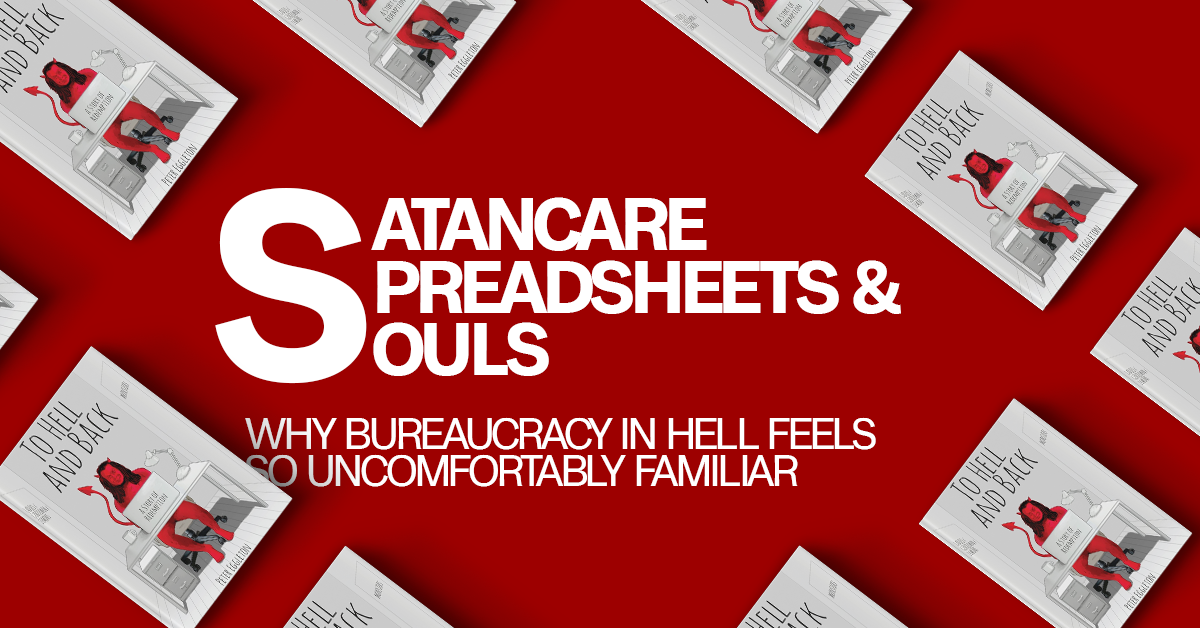Welcome to Hell—Please Hold for the Next Available Demon
In Peter Eggleton’s sharply satirical novel To Hell and Back, readers are taken on a trip to the underworld that’s less fire and brimstone, more phones on hold and office memos. Imagine descending into eternal damnation, only to be met with a cheerful but soulless auto-attendant: “Press 1 if you’re remorseful. Press 2 if you were just having a bad day…”
Yes—this is Hell, but not the kind Dante imagined. Eggleton’s underworld runs like a bloated, bureaucratic corporation, complete with HR violations, unpaid interns, and a healthcare system called Satancare. It’s painfully hilarious, darkly clever, and just plausible enough to feel real.
The Premise: A Slip of the Tongue Becomes a Slip into Hell
Our protagonist, Samantha, is no villain. She’s a snarky, sharp-witted jewelry store employee whose greatest crime seems to be muttering the wrong curse at the wrong time. But in Eggleton’s satirical version of metaphysical justice, that’s enough. With a jolt, she’s transported to Hell—though not in flames, but in confusion, paperwork, and the discomfort of endless process.
As she’s shuffled through departments and scanned by emotion-detection systems, Samantha meets the Extreme Correctional Operatives (ECOs), who are essentially underpaid demons in suits, burdened with forms and performance reviews. Their job isn’t to punish the damned with fire—it’s to file their regrets under the correct code.
Satancare: The Infernal Healthcare Plan No One Asked For
One of the novel’s most scathing (and brilliant) satirical elements is Satancare—the demonic equivalent of a government-mandated healthcare plan. It’s a biting send-up of bureaucratic inefficiency, filled with convoluted approval processes, misdiagnosed emotions, and spiritual pain measured in insurance units.
If you’ve ever sat on hold with your health insurer while contemplating your own mortality, Satancare hits a little too close to home. It’s this blend of absurdity and familiarity that makes Eggleton’s satire so effective. He isn’t just making Hell ridiculous—he’s making our reality look equally preposterous.
The System Is the Punishment
What’s most disturbing—and darkly funny—about To Hell and Back is that Hell doesn’t need to actively torment its residents. The torment lies in the systems themselves: rigid, indifferent, and self-replicating.
Samantha quickly realizes that punishment in this version of Hell isn’t fire—it’s futility. Every question leads to another form, every form to another hallway, and every hallway to a committee. It’s like being trapped inside a corporate meeting that never ends—with your soul on the line.
This is where Eggleton’s satirical knife cuts deepest. Readers are forced to acknowledge that we’ve built similar systems on Earth—systems that reward compliance, punish emotion, and confuse process with progress. If Hell is just Earth with less sunlight and more paperwork, what does that say about us?
Laugh First. Cringe Later.
On the surface, To Hell and Back is laugh-out-loud funny. The dialogue sparkles with wit, the characters are deliciously absurd, and the plot twists with the precision of a master satirist. But Eggleton isn’t just after chuckles—he’s after reflection.
It’s only after the third or fourth laugh that the message lands. Why do so many of Hell’s ridiculous structures feel eerily familiar? Why are we laughing at Samantha’s torment—then realizing we’ve been in her shoes, metaphorically, at the DMV or during a corporate training session?
Eggleton has crafted a satire that doesn’t just poke fun at Hell. It pokes fun at us. At the systems we’ve accepted. At the offices, policies, and forms we’ve come to see as “just how it is.”
A Redemption Story for the Modern Soul
And yet, for all its snark, To Hell and Back is ultimately hopeful. As Samantha navigates Hell’s tangled corridors, she begins to question not just the system—but herself. Her journey becomes one of introspection, change, and a desire to do better, even if the odds are against her.
That’s what elevates this novel from mere satire to something deeper: a recognition that even within broken systems, there’s room for individual transformation. Redemption may not come through divine intervention—but it might just come through self-awareness and the occasional act of empathy.
For Fans of Kafka, The Good Place, and Anyone Who’s Ever Been on Hold
To Hell and Back is a must-read for anyone who loves their fiction sharp, funny, and uncomfortably real. Fans of Catch-22, The Good Place, The Hitchhiker’s Guide to the Galaxy, and Kafka’s bureaucratic nightmares will find plenty to enjoy—and even more to think about.
Eggleton has built a Hell that reflects the absurdity of Earth—and a heroine who challenges it, not with weapons, but with wit.
So, the next time you’re stuck on hold or filling out forms you don’t understand, ask yourself: Is this Hell—or just another Monday?
Amazon Link: To Hell and Back


Leave feedback about this